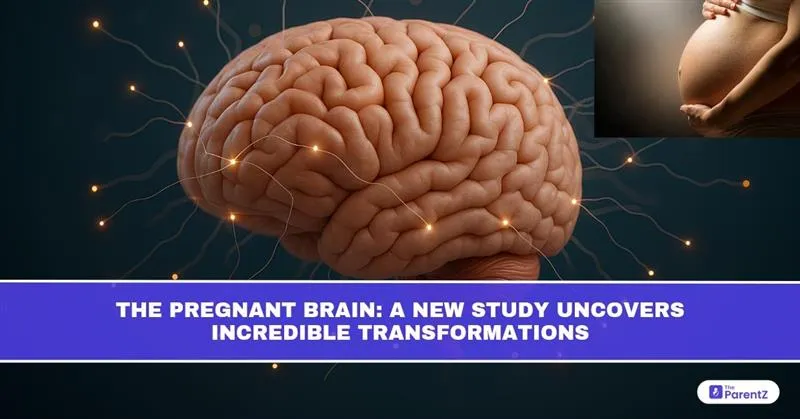A Mind Quietly Rewired
Pregnancy is often associated with visible changes, a growing belly, swollen feet, or that “glow” people talk about. But what happens inside the brain is rarely discussed, even though some of the most dramatic changes occur there. Recent studies have revealed that the pregnant brain is not just passively supporting the body; it is being reshaped, rewired, and repurposed in subtle but significant ways.
Until recently, these transformations were largely overlooked. But now, thanks to advanced imaging studies and long-term observation, a deeper understanding is being formed and with it, a profound respect for the neurological journey of motherhood.
What Was Discovered?
In a groundbreaking study led by researchers in Europe, brain scans were conducted on women before and after their pregnancies. These women were then compared to a control group of non-pregnant women. The results were striking: certain regions of the brain were found to be reduced in volume during pregnancy, especially areas related to social cognition and emotional regulation.
This shrinkage was not a sign of damage; rather, it was believed to be a process of neural pruning. In the same way that unnecessary branches are trimmed from a tree to make it grow stronger, the brain was thought to be simplifying and refining itself, becoming more efficient.
Why Does This Happen?
The changes observed in the pregnant brain are thought to be adaptive, the body’s way of preparing a woman not just physically, but emotionally and cognitively, for motherhood. It’s believed that:
- Empathy is enhanced so that a mother becomes more attuned to her baby’s needs.
- Memory and attention are redirected towards tasks most relevant to caregiving.
- Emotional responses are intensified, possibly to build stronger bonds with the baby.
Though sometimes casually referred to as “pregnancy brain” or “mommy brain,” these shifts are not simply about forgetfulness. Rather, the brain is believed to be selectively refocused, prioritizing what truly matters in the journey ahead.
What Areas of the Brain Are Affected?
The most consistent changes have been observed in the hippocampus, prefrontal cortex, and amygdala areas involved in memory, decision-making, and emotional processing.
1. The Hippocampus
This region, which plays a key role in memory, has been found to shrink slightly. As a result, some mild forgetfulness or “mental fog” might be noticed during pregnancy or shortly after childbirth. But this isn’t viewed as a sign of cognitive decline. Rather, attention is being rerouted to things like recognizing baby cues or remembering routines relevant to infant care.
2. The Prefrontal Cortex
Involved in planning, judgment, and impulse control, the prefrontal cortex is believed to undergo functional changes. Mothers have been shown to respond more sensitively to images or cries of babies, suggesting that this part of the brain is being recalibrated toward caregivers.
3. The Amygdala
Responsible for emotional reactivity, the amygdala becomes more responsive during pregnancy and into the postpartum period. It is believed that this shift helps mothers remain alert to danger, become more emotionally connected to their infants, and even experience stronger feelings of love and protection.
Are These Changes Permanent?
In some cases, yes. Brain scans taken two years postpartum have shown that certain changes, especially those involving social cognition, remain even after the early years of motherhood. This suggests that pregnancy may leave a lasting imprint on how a woman thinks, feels, and responds to others, particularly her children.
However, it should be emphasized that these changes are not seen as a loss of ability. Instead, the brain is believed to be optimised for the demands of parenting. Think of it less as a “decline” and more as a redirection of intelligence and emotional energy.
How Does This Affect Emotions?
Pregnancy and early motherhood often bring emotional highs and lows. The rewiring of the brain likely plays a role in this. Mood swings, intense bonding, increased sensitivity, all of these, can be partly attributed to how the brain is being reshaped.
Understanding that these emotional shifts are rooted in biology can bring reassurance. Mothers aren’t being irrational or overreacting; their brains are simply operating in a new, deeply purposeful way.
Myths vs. Reality
It is often said that pregnant women become “hormonal” or “forgetful,” but these ideas are oversimplified. The truth is far more nuanced:
- Myth: Pregnancy makes women less capable. Reality: Certain brain functions may be shifted, but not diminished.
- Myth: Emotional changes are psychological. Reality: They are neurological, hormonal, and deeply connected to brain rewiring.
- Myth: These changes are temporary. Reality: Some may last years and reflect a lasting evolution of the maternal brain.
What Can Be Done to Support This Change?
1. Sleep and Rest Should Be Prioritized
Because the brain is working hard behind the scenes, sleep is not a luxury; it’s essential. Pregnant and postpartum women often feel more mentally drained, and that’s valid.
2. Emotional Support Must Be Strengthened
With emotional sensitivity heightened, reassurance, patience, and empathy from partners and family members can make a world of difference.
3. Self-Compassion Should Be Practiced
Women may feel frustrated with their shifting memory or mood. But understanding that these are natural adjustments can make it easier to forgive oneself and adapt gracefully.
Final Thoughts: A Quiet Superpower
The pregnant brain doesn’t get much attention and yet, it undergoes one of the most remarkable neurological transformations in human life. What might appear on the surface as absent-mindedness or moodiness is, in fact, a profound recalibration happening deep within. These changes are not weaknesses. They are evolutions allowing a woman to transition from self to shared identity, to become not just a caregiver, but a deeply attuned protector, nurturer, and guide. So the next time a pregnant woman forgets an appointment or sheds an unexpected tear, it need not be dismissed or ridiculed. A complex transformation is being lived quietly, powerfully, and beautifully.






Be the first one to comment on this story.